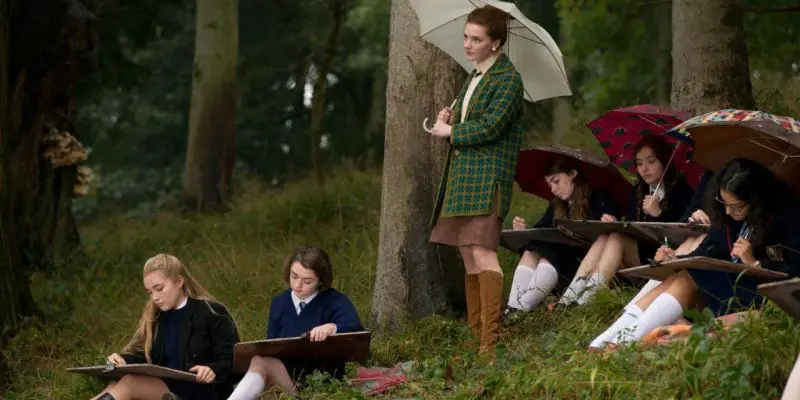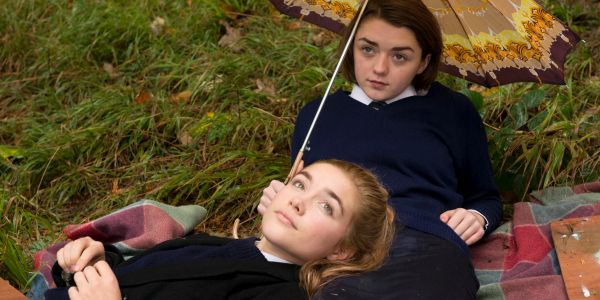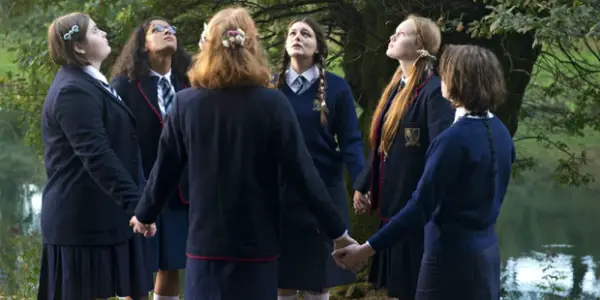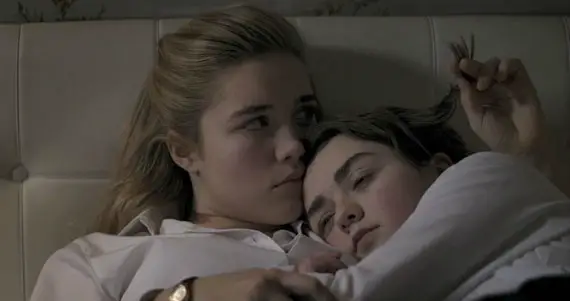THE FALLING: Being a Teenage Girl Sucks

Becky spends her days working in TV and she spends…
The Falling, the first drama feature by critically acclaimed director Carol Morley, went largely unnoticed on its general release. Despite collecting high praise from the critics, and starring Game of Thrones’ Maisie Williams in the lead role, The Falling was almost a blink-and-you-miss-it situation. This seems absolutely tragic, as I would have no reservations in rating it as my favourite film of 2015.
Morley’s history as a director lies in documentaries, most notably Dreams of a Life (the heart-breaking true story of a woman who died and was undiscovered in her London flat for three years) and The Alcohol Years (a biographical film about Morley’s own teenage years). The Falling itself is vaguely based on true accounts of mass faintings in the UK, commonly attributed to hysteria but always medically unexplained by doctors. Morley took inspiration from various accounts, including one in a school, and went on to write and direct The Falling.
The plot is uncomplicated and can be described simply as the story of a group of young teenage girls who fall prey to a mass fainting epidemic at their school, possibly instigated by the death of the group leader. Maisie Williams plays Lydia ‘Lamb’ Lamont, best friend to the popular and beautiful Abigail Mortimer (newcomer Florence Pugh). There is a power dynamic between the girls, a mix of awe, love and jealousy which leaves a residue which would hardly be out of place in a Margaret Atwood novel.
The death of Abi early on and the consequential fainting epidemic is the immediate narrative but The Falling is really concerned with female relationships, sexuality, how we relate to one another and the world around us, the angst of being a teenage girl and that thin line behind childhood and adulthood. It’s a lot more than just fainting.
Magic realism at its finest
The first thing we should talk about is the sound design. It’s not often that a soundscape captures the mood so fully as it does in The Falling. Some have even described the film as a musical due the music being so intrinsically linked to the action. The score is so vital to shaping the action on screen and sometimes feels pre-emptive of certain events. Abi and Lydia play instruments in ‘The Alternative School Orchestra’ (which is pretty much what you’d expect from the name), and the creepy music the girls play is used throughout the film.

It’s eerie and incredibly alternative, using vocals and an assortment of instruments to provide a chilling soundtrack to both the girls lives and the film. Tracey Thorn, of Everything But The Girl fame, provides the soundtrack to the film – which is probably one the greatest things about it. Her unique and powerful vocals add so much momentum to what may otherwise be underwhelming sequences.
In terms of visuals and pacing there are some very clear inspirations for The Falling. Morley says herself that Picnic at Hanging Rock (Peter Weir, 1975) was one film she drew heavily upon and that reference is not wasted here. Not least because it’s a film which is also about school girls, but both films are grounded in reality yet retain a sense of the uncanny. We are never sure whether we fully believe in the ‘magic’ we are seeing. There is little explanation and although we are invited to identify with Lydia and the other girls, it is never clear to us whether the fainting is an act or whether it is the result of some strange magic/spirituality that we can’t see.
Visually, the film is stunning. The film actually begins with beautiful shots of the English countryside, the school which the girls attend is surrounded by an oasis of nature. The greens of the trees and grass contrasted with blues of water become important later on – Abi and Lydia have their own tree which becomes symbolic of Abi, and of their friendship. Nature is an important element in The Falling, and the camera treats it like another character.

A truly striking aspect of The Falling is actually the schoolgirls themselves. Teenage/pre-pubescent girls in cinema tend to be overly sexualised, often played by actors that are much older than their screen-age. In The Falling, the school girls looked like…well, schoolgirls. They are diverse in weight and height; many of them have acne and greasy hair. It was a completely real representation of what young girls look like at that age. Unpolished and unperfected.
This extended to the background actors – each of them felt like individuals. Instead of using young girls as dressing or for their sexuality, The Falling makes a point of giving these girls autonomy, even if it’s just through their visual appearance. They are certainly the most realistic group of teenage girls I have ever seen on-screen. All of the individuals elements are so finely tuned together, that it is only when they all coincide that the film comes into its own. It feels crafted and purposeful, yet at the same time has an incredibly gritty and natural atmosphere throughout.
Growing up is complicated
Lydia begins her journey watching from the sidelines as her best friend explores her own sexuality – eventually having sex with Lydia’s own brother – whilst Lydia herself is disinterested in boys. There is a poignant love story between Lydia and Abi themselves, the love between two best friends, that Lydia is almost lamenting the loss of at the beginning of the film. It’s a love that so strong, it is almost hatred.
Maisie Williams and Florence Pugh are infallible as Lydia and Abi, creating perfect moments of intimate friendship before our eyes. I felt Lynchian elements creeping in as we look at Abi and Lydia on-screen, with Abi as our enigmatic Laura Palmer. She’s on the fringe of adulthood, with so much life but she is cut down before she can truly live. Such is the curse of female sexuality.
The Falling also excels at desexualising its sex scenes. The camera frames the characters in wide shots, and the off-centre composition remind us that Abi and Lydia are still children no matter how much they try to behave like adults. We are disconnected from the scene, and we view it objectively for what it is. This isn’t to say that we don’t identify with the girls – the film has a great deal of empathy for what Lydia and Abi are going through and it is never trivialised.

The climax of The Falling, the mass fainting scene in the school hall, combines all of these elements to produce something eerie, creepy and seemingly out of this world. At this moment, Morley seemingly ties together ideas about women, nature, the female body and witchcraft. There is never any certainty about whether the girls are spurred on by each other or whether something truly physical and threatening is taking place.
In a way, it doesn’t really matter. It’s overly dramatic, breathy and falls completely into the region of the uncanny. The phrase ‘female collectivity’ has been used to describe The Falling and I think this is absolutely spot on. It’s not just the school girls or Lydia’s group of friends. This collectivity extends to the female teachers and Lydia’s mother – it connects all women together.
The only, very small, gripe that I have with The Falling is the necessity of including the incest storyline and that of Lydia’s father. It’s true that these two elements help us to understand Lydia’s anger and relationship to her mother. However, these two subplots were explored in such a small capacity, that they felt like a small distraction to the actual narrative of the film. The film itself has received incredibly mixed reviews (although most critics lean to side of ‘masterpiece’) and I can see why it might not appeal to everyone. There are no answers at the end, only more questions.
Conclusion
With its soft, dream-like quality, The Falling is a twisted and painful coming of age story, one that I think most girls could relate to. The events that transpire are in no way universal, but the feelings of expectations, suffocations and insurmountable pressure are things that almost every teenage girl feels at some point. The Falling speaks out to young women and represents that feeling of discomfort and complete bewilderment about their bodies, their futures and their minds. It does feel very similar to fainting…
Have you seen The Falling? What do you think of its representation of young school girls, or femininity and girlhood in general?
https://www.youtube.com/watch?v=0auI3ko4n20
Does content like this matter to you?
Become a Member and support film journalism. Unlock access to all of Film Inquiry`s great articles. Join a community of like-minded readers who are passionate about cinema - get access to our private members Network, give back to independent filmmakers, and more.
Becky spends her days working in TV and she spends every other minute writing about cinema, TV & feminism. Based in London, she also likes drinking gin, re-watching 'The X Files' and writing about on-screen representation and all manner of things over at femphile.com













